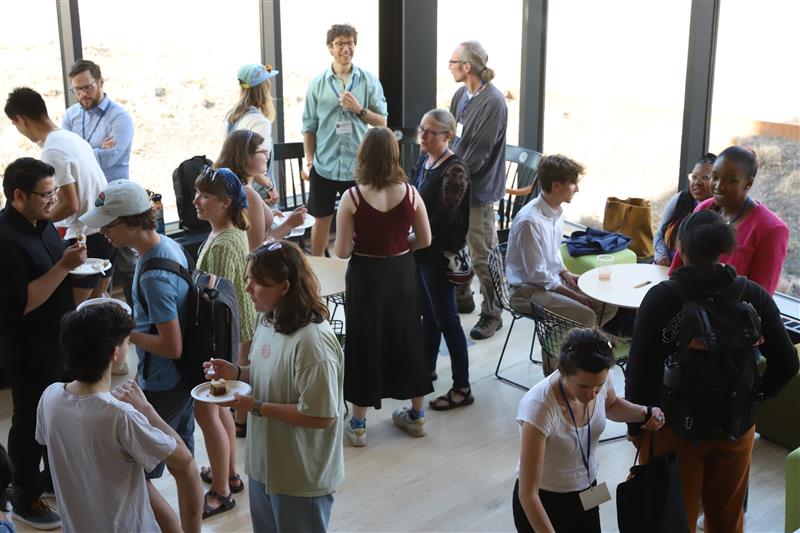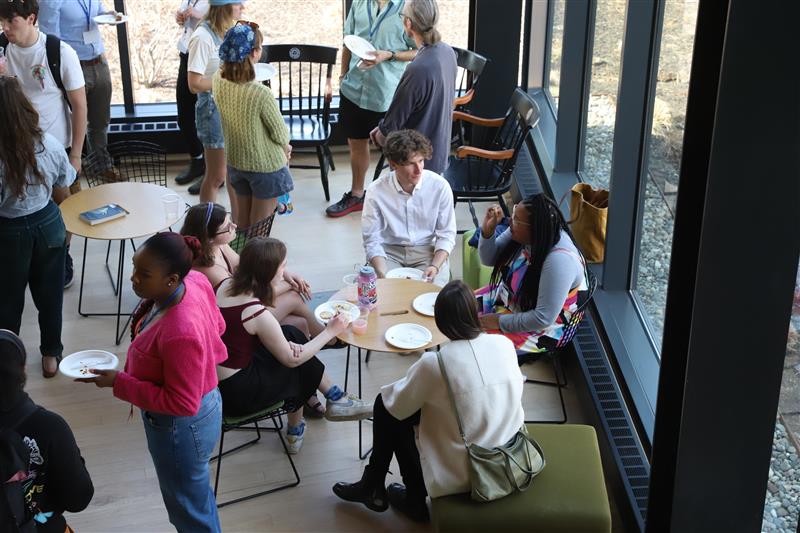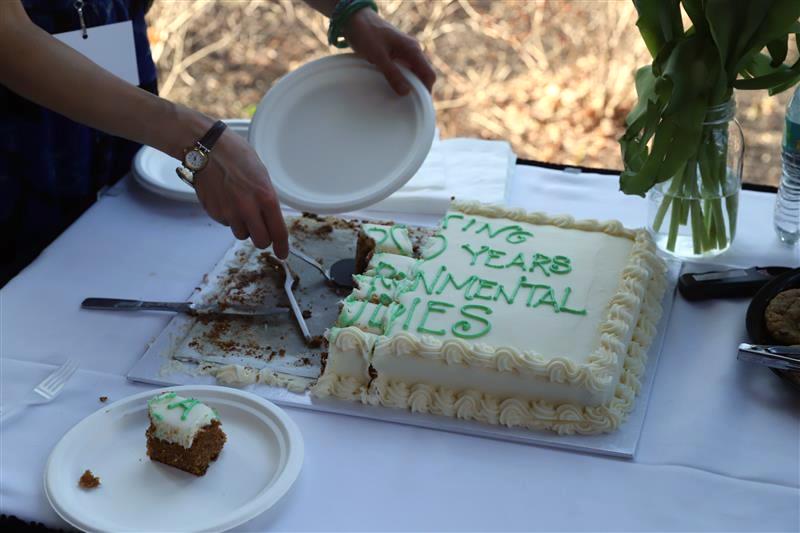At Fifty: Environmental Studies Symposium Imagines the Future
By Rebecca Goldfine and Jane Godiner '23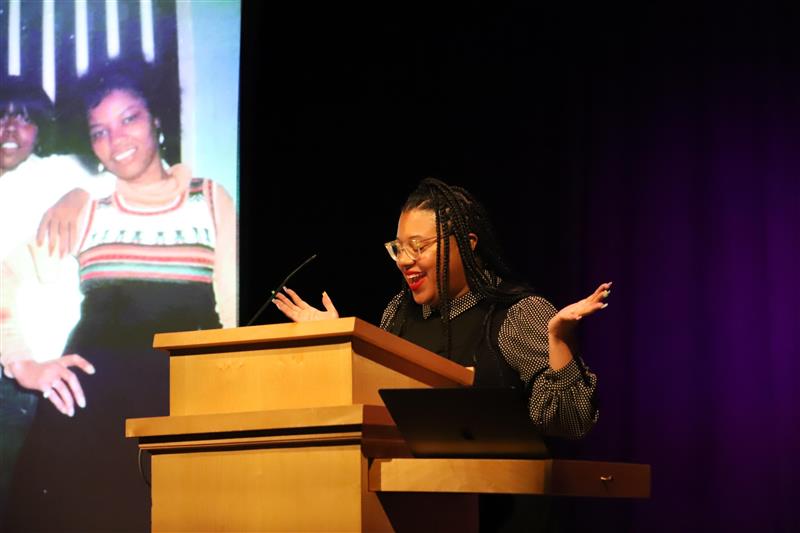
The 50th Anniversary Symposium's keynote speaker, Teona Williams ’12—an environmental justice scholar and Black feminist historian—set the tone for the two-day symposium at her talk in Kresge Auditorium on April 13. She urged the audience to think about how to shape the field for the future.
"I want to end with a question for you all to consider," she said. "What do the next fifty years of environmental studies look like?"
After making a case for working collectively to end environmental destruction, oppression, and racism, she provided the answer for herself. It is one she has reflected on over a varied career, both as an activist in places like Flint, Michigan, and Jackson, Mississippi, and as an academic at the University of Michigan and Yale University, where she earned her master's and doctorate degrees, respectively.
"The next fifty years of ES as I will practice it will be rooted in abolitionist futures," she said. "Environmental studies as I will now practice it demands...that abolition be green, for we must abolish environmental racism and environmental degradation."
She continued, "Environmental studies as I will practice it has to center the needs and well-being of those most vulnerable, because if you help the most marginalized you will, by extension, help everyone."
Pointing to a main focus of her career—to encourage the joining of environmental organizations with activists demanding racial justice—she said she will continue to push for the end of militarized police and prison institutions and to redirect their funding to grassroots organizations and community development programs.
Finally, she said, "Environmental studies as I will practice it centers the knowledge and approaches of Black and Indigenous communities who have already lived through millions of apocalypses."
"From here on out, environmental studies for me will be emancipatory. It will be used to help break chains, and it will center that our future generations are actually our greatest gift."
Welcoming the Storytellers, Climate Experts, and Planners
Professor of History and Environmental Studies Connie Chiang, chair of the Environmental Studies Program, introduced the day of discussion on Friday, April 14, by briefly revisiting the history that gave rise to environmental studies at Bowdoin.
In the late 1960s, Maine's beaches and roads were covered in litter, rivers foamed with industrial waste, and sewage was discharged directly into the ocean. "As Bowdoin students grew increasingly alarmed, a small group of faculty began to think about what they could do in the long term and arrived upon the creation of an academic program," she said.
From its start, Bowdoin's ES major was designed to be a coordinate major, which means students pair it with a second major in another discipline. "...ES can be seen as the epitome of the liberal arts at Bowdoin," Chiang said. "Because environmental issues transcend disciplinary silos, our curriculum pushes students to embrace an expansive vision and become intellectually nimble."
- 1,221 individuals have received (or will receive) a degree in environmental studies from Bowdoin.
- 193 students have interned with 53 different organizations and governmental agencies (34 in Maine) through the ES summer fellowship program (founded in 2000).
- The ES introductory course, Environmental Studies 1101, is the largest class at the College and one of the most popular.
She praised the fourteen ES alumni who had returned to campus to speak at the symposium, saying that their "collective expertise and wisdom will also help us think about how we need to change and evolve to best prepare our students to navigate the environmental problems of today and the future."
The alumni, who represent a diversity of fields, spoke on one of three panels: environmental storytelling, climate change and sustainability, and environmental planning. "My colleagues and I debated several topics to discuss today, but we ultimately determined that these panels express our mission and interdisciplinary curriculum particularly well," Chiang said.
Environmental Storytelling
"Environmental storytelling reminds us that changing minds and policies requires skilled narrators and compelling narratives that illuminate diverse voices and perspectives." — Connie Chiang
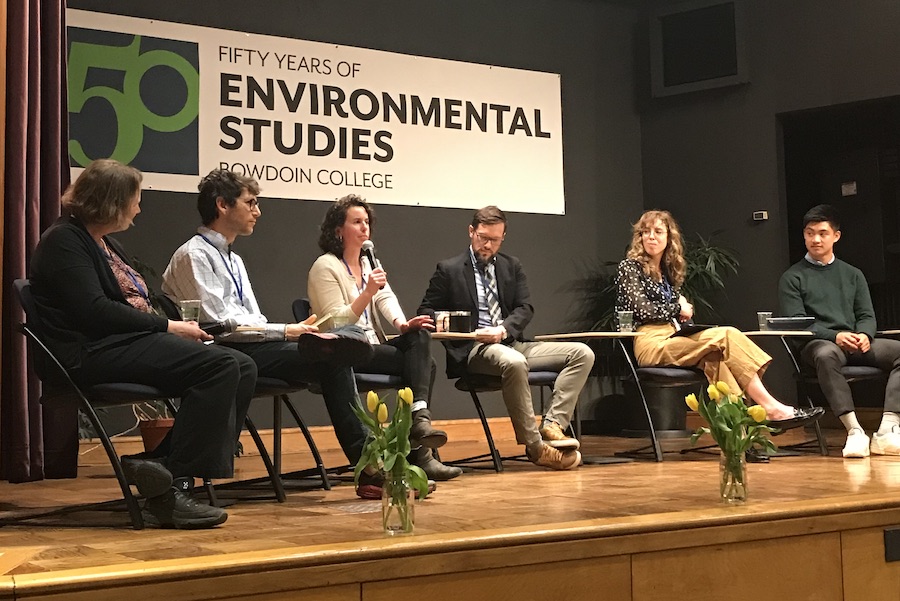
The panel, featuring Erica Berry ’14, Emily Guerin ’09, Nat Herz ’09, and Corbin Hiar ’05 and moderated by Senior Lecturer of Environmental Studies Eileen Johnson and Paul Wang '24, explored the intersections between multimedia storytelling and environmental reporting.
One of the key takeaways from the panel, for attendees and panelists, was the nonlinear nature of environmental storytellers’ career paths. From NPR reporting to podcasting to freelance journalism to book writing, panelists represented all corners of the world of storytelling.
“One of the most interesting things about this panel was that we all have taken different routes,” Berry said. “And, yet, being able to sit there and talk across that was hugely inspiring.” Berry, a writer based in her hometown of Portland, Oregon, has been published in The Guardian, Wired, Outside, The New York Times Magazine, The Yale Review, and The Atlantic. Her debut book, Wolfish: Wolf, Self, and the Stories We Tell About Fear, was published in spring 2023 by Flatiron Books (US) and Canongate (UK).
“Because we had panelists from different careers and different disciplines, both the importance of the liberal arts and of interdisciplinary perspectives in addressing and making progress on the environment were reinforced,” added Johnson.
Over the course of the discussion, panelists illustrated the symbiotic relationship between environmentalism and telling stories—and how one discipline can support the other.
“Environmental studies touches everything, and there are elements of storytelling in almost everything that people are studying here,” Herz said. He is a reporter in Anchorage, Alaska, where he lives and writes about government, politics, and public lands and waters. “There’s a lot that folks in traditional academic disciplines can learn from what we do as storytellers and journalists.”
Like Herz, Wang emphasized the necessity of storytelling skills—along with scientific knowledge—in climate advocacy. “People who study biology and who conduct research also have to be in tune with how to communicate the various complexities and nuances of climate change,” he said.
Panelists also emphasized the value of a Bowdoin education in preparing them to tell thorough and impactful environmental stories.
“A lot of us talked about how everything is an environmental story, and that you can see so many different kinds of stories through an environmental lens,” said Guerin, a podcaster for LAist 89.3, the NPR member station in Los Angeles.
Berry felt that the opportunity to return to Bowdoin and to share what she’s learned, as well as to hear from her peers, was both personally and professionally fulfilling.
“There's something about being able to talk to other writers when you’re not under deadline or collaborating—you get curious,” she said. “I knew that the panel was going to make me reflective about Bowdoin, but I didn’t think it was going to fire me up professionally and make me feel so supercharged.”
For students like Wang, the event also served as a meaningful professional development opportunity. “Meeting and communicating with the panelists, it was really awesome to see how much they enjoyed their experience at Bowdoin and how they’re so willing to help current students,” he said.
During the discussion, panelists also acknowledged the historical inaccessibility of the field of environmental studies, and discussed methods of bringing more faces, voices, and representation to the table.
“When [Berry] spoke about whose voices get heard, I think that was one of the really important parts of the discussion,” Johnson said. “At any point in time, we make choices about whose voices get heard and whose voices get elevated. I thought the panelists did an amazing job touching on that.”
“There is definitely a need for more diverse voices and perspectives and stories,” Hiar added. “I hope that we communicated that.” Hiar works for E&E News, and his work has also been published by Scientific American, Science magazine, The Economist, and many others.
Despite the challenging road ahead, Wang is optimistic about the inclusive future of environmental studies at Bowdoin and beyond.
“Something that stuck out to me was the adaptive nature of environmental storytelling and the nature of their jobs,” Wang said. “It was really cool to see how much the industry is changing and how quickly they have to respond to these complexities.”
Climate Change and Sustainability
"Climate change and sustainability speaks to one of our greatest challenges and our greatest potential avenues for hope." — Connie Chiang
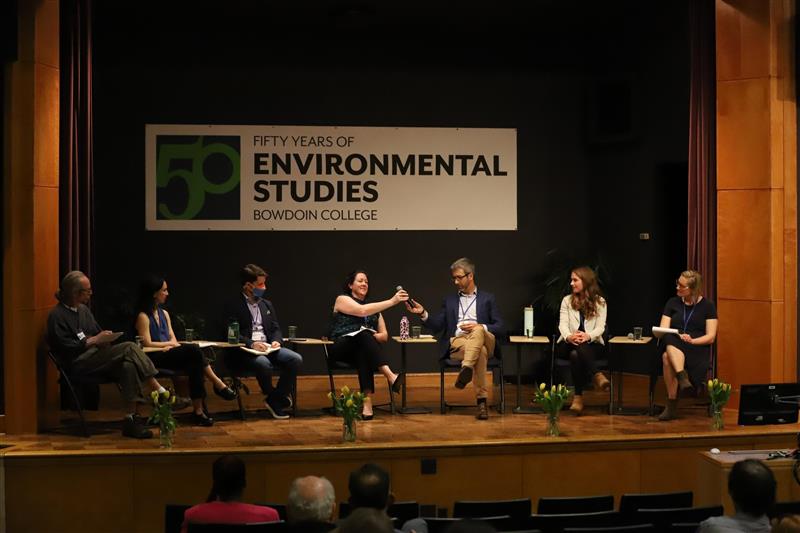
The five panelists have jobs that span the globe—from Boston to Bangkok—and work with a range of institutions: public agencies, a business, a university, and an environmental nonprofit.
Brooks Winner ’10, a senior clean energy specialist at the Metropolitan Area Planning Council, helps communities in the greater Boston area transition away from fossil fuels and prepare for climate changes.
Payton Deeks ’10 is the regional conservation advisor with USAID's Regional Development Mission for Asia, based in Bangkok, Thailand. She works with communities throughout Asia to adapt to rising seas and lessen other climate change impacts.
Hannah Berman ’18 works on Aspen Skiing Company's sustainability efforts. The business has set a precedent for skiing companies to push for climate change advocacy and to adopt aggressive mitigation efforts.
Greg Goldsmith ’05 is an assistant professor of biology at Chapman University in Orange, California, where he studies the effects of climate change on the flow of water and carbon through terrestrial ecosystems.
Alison Flint ’05 is the senior legal director for The Wilderness Society, a national nonprofit that protects wild places in the US. She uses her legal and policy expertise to help ensure that public lands are included in our climate solutions.
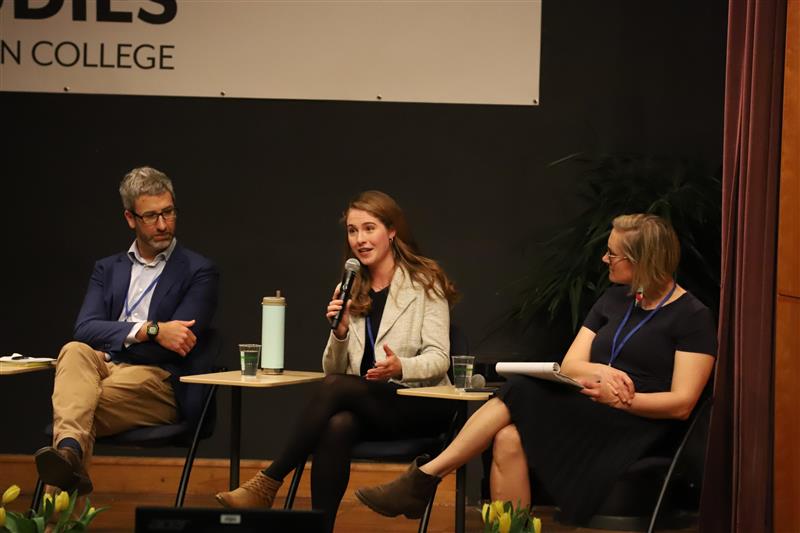
Successes and Challenges
The conversation covered a range of issues. The following provides just a flavor of some of the points raised.
In response to a question from Burchell on the greatest and lowest points in their careers, Goldsmith started off with a success.
"We rolled out a course on equity and inclusion in science and engineering," he said, arguing that this should be mandatory for all scientists and engineers. It teaches students the history of who has, and has not, participated in these fields and who has benefited or been harmed by advancements coming out of them.
One of Winner's challenges, he said, is that when he's writing climate action plans he's questioned at times by some residents in affluent communities about why they should be concerned about equity. "I'm figuring out how to push back on that," he said. His response to them is that decades of racist policies have brought us to this precarious point, and carrying on in the same way won't bring new results.
Berman said she's been disappointed that more ski industry trade groups haven't joined her company in lobbying for sustainable policies. "They could have a lot of weight and influence...[but] they've not been very vocal on the environment," she said.
On the other hand, her company has pushed a Colorado public utility to adopt cleaner energy sources, in part by campaigning to elect more progressive members to its board.
Flint said she continues to battle the federal government over permitting oil and gas extraction on public lands, a situation that has not improved under the Biden administration.
However, in the last two weeks, she's been buoyed by a new policy proposed by the Bureau of Land Management to manage 245 million acres in a way that would focus on conservation, climate and ecological resilience, and wildlife connectivity, and protect and co-steward lands of cultural importance for Indigenous tribes. "This is a baby step toward what we need to see," Flint said.
"We Need You"
In response to a question from Camill on what they envision the most exciting work on climate and sustainability to be in the coming decades, Deeks had a few specific ideas to share with students. Understand carbon markets, she advised, and study the role of natural solutions in battling climate change.
Also, she added, pay attention to both climate refuges and refugees, as conflicts about them will become geopolitical flashpoints.
In the end, Deeks urged students to stay committed to building a better future. "We need you, don't give up. We need smart, young, enthusiastic brains to help address these really challenging problems. Keep at it," she said.
Environmental Design and Planning
"The planning and design field develops, preserves, and enhances the built environment with the goal of creating communities that are socially, economically, and environmentally just." — Moderator Jill Pearlman, senior lecturer in environmental studies
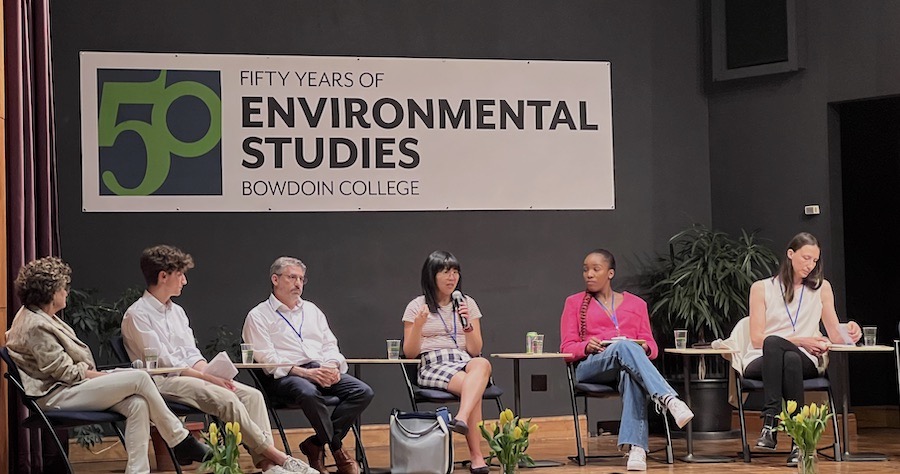
This panel conversation covered a number of topics, from gentrification, affordable housing, and resilient infrastructure to the differences between working with communities that lean left or right politically. Below is a sampling of the discussion.
Sam Brody ’92, who, as Regents Professor in the Department of Marine and Coastal Environmental Sciences at Texas A&M University, studies how to bolster coastal resilience in Texas. "There's a huge untapped need to understand how to live with emerging hazards and disasters," he said.
Grace Cho ’05, a Metro senior transportation planner in Portland, Oregon, works to improve the regional transportation system by, for instance, limiting carbon emissions and increasing access to the system.
Symone Howard ’15 is an environmental protection specialist with the US Department of Transportation, where she writes environmental assessments, reviews grant applications for environmental impacts, and audits projects.
Adrienne Heflich ’05 designs and builds public landscapes as associate principal with Michael Van Valkenburgh Associates, based in Brooklyn, New York.
How they get the work done
In a question posed by co-moderator Leif Maynard ’23 about how panelists incorporate resiliency planning into their day-to-day work, Brody mentioned that he has to parse his language if he wants his projects to be successful.
"I don't mention climate change," he said. "I talk about future conditions." This way, he can sidestep political tensions while bringing people to a consensus on implementing practical, lifesaving plans for communities.
Heflich said she also has to come up with semantic workarounds when she's in certain regions. "You can't say 'climate crisis' or 'climate change,' but you can say resilience," she said. "And there is still so much progress to be made even if you have to be crafty with your language."
Cho, who noted she doesn't have to avoid using the term climate change in Portland, said her work benefits from thoughtful planning by her predecessors, going back to the 1970s. "Regulated land-use management helps us be smarter about our development process," she said.
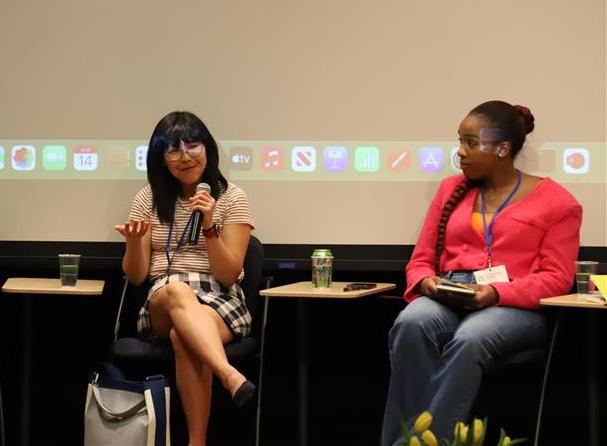
The value of diverse perspectives
During the Q&A, a student asked Cho and Howard if being women of color in traditionally male-dominated fields has impacted their careers.
Cho said she's given thought to how to diversify the field, and increasingly speaks up about hiring candidates from nontraditional planning backgrounds, looking not just at those with master's degrees in planning, but also effective community organizers. "We need to bring the outside in," she said.
Howard said she "recognizes and remembers" that she is a "valuable voice in the room," one that might be more attuned to and adept at advocating for historically marginalized groups. She recounted a time she was asked to review applications for transportation funding from communities around the country, including Native American reservations.
"One that I remember was for a tribe in Wisconsin," she said. "The application was great and they were in desperate need of transit options, specifically a bus." Though they had applied for DOT funding several times, their project had been repeatedly refused. This time, however, Howard saw value in their request and recommended they utilize grant monies—a recommendation adopted by the agency.
"Those are the things that keep me inspired and keep me in the room," she said.
